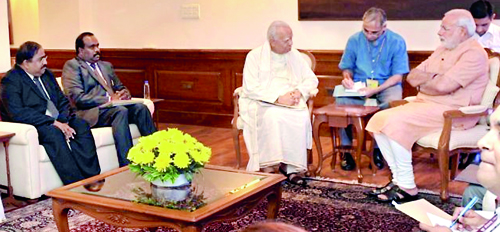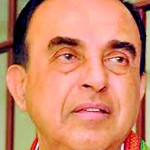Sunday Times 2
Indo-Lanka ties have more than some wrinkles
Even if President Rajapaksa manages to swing a bilateral meeting with the Indian Prime Minister Narendra Modi during his current visit to New York for the UN General Assembly sessions and Commonwealth meetings, it will be more of a preliminary skirmish. The Modi government’s stand on Sri Lanka seems somewhat unclear in these early days.
Although some government politicians have been upbeat at the victory of the Modi-led BJP at the last Indian national elections, it seems a rather premature assessment largely based on a misreading of the actual political weight that Subramanian Swamy swings in the BJP.
He is not a member of the Lok Sabha. Nor does he seem to have any portfolio or specific position that would make him a lead figure in the BJP-government that now rules in New Delhi.

A Tamil National Alliance delegation led by R. Sampanthan meeting Indian Premier Narendra Modi in New Delhi last month. Premier Modi assured the TNA of India’s continuing support for relief, rehabilitation and reconstruction works in Northern and Eastern Sri Lanka. Pic courtesy Hindu
The Sunday Times Political Editor was quite percipient when he questioned Swamy’s credentials in his column about a month back. It was timely since it appears that the Sri Lanka Government is not only ready to lay it out thick but actually does so, when the man arrives in town.
Quite rightly this newspaper mentioned his antecedents and the demands he is said to have made way back when, if Sri Lanka needed further assistance from India.
Whether Dr. Swamy has turned a new leaf or an entire book is not the point at issue. The central question is whether he does have the clout within the ruling party to be able to change or influence a new direction in Indian foreign policy as some in Sri Lanka seem to think he could.
Even assuming that the Harvard-educated Swamy is as good as his word and he is able to make India adopted and follow a more amenable policy towards Sri Lanka, there is a bottom line that even a friendly Indian government cannot cross.
That line is what has bogged down the Sri Lanka Government in the latter years of the conflict and in the post-war period.
Diplomats and commentators, including Indian journalists in London argue that the Indo-Lanka Accord is a binding international agreement and for either side to violate it or ignore it is to breach an agreement signed by the two sides.
The 13th Amendment to the Sri Lanka Constitution which is product of that Accord and grew out of it has proved to be the stumbling block to smooth bilateral relations.
As India would argue it is a valid agreement between two countries and any deviation or dimunition from that would be a violation. And no Indian Government would be ready to deviate from it without earning the displeasure and in some cases the wrath, of sections of the Indian populace.
Moreover it would also cause India’s commitment to international or bilateral treaties to be questioned.
No doubt Sri Lankans would take a different view of the Indo-Lanka Accord. It is generally perceived as an accord that was foisted on Sri Lanka by the regional hegemon using its superior military and diplomatic clout.
If I remember correctly — I was still in Colombo at the time the accord was signed — it was only Bangladesh that publicly protested at India’s violation of Sri Lanka airspace to drop its so-called humanitarian assistance which Sri Lankan’s derisively called the “parippu drop.”
However Sri Lanka terms it — an unequal treaty, an accord imposed on Colombo or whatever — the simple truth is India will not go back on it, certainly not without losing face, domestically and on the international stage.

Subramanian Swamy
The Rajapaksa administration might well claim that this was an agreement which it had no part in. That is factually true but to try and go back on it will not be acceptable to either India or to the local Tamil people.
The Sunday Times Political Editor said in his column on 31st August that at the meeting between the TNA delegation and Prime Minister Modi in New Delhi, the Indian prime minister had “acknowledged that President Rajapaksa had given assurances to the Government of India that he would implement the 13th Amendment and go beyond it.”
Now that does not sound like a man who has not done his homework though he may be new to the job. That is the bottom line I was speaking of and it certainly does not seem that New Delhi is going to lower the sights.
Of course Delhi wants the TNA not only to engage in a direct dialogue with the Sri Lanka Government but discuss issues with other Tamil speaking groups such as the Muslims and the plantation sector. It wants to make sure that the persons of Indian-origin who had settled in Sri Lanka are not ignored in any future political discourse.
The problem for Mahinda Rajapaksa is the provision relating to police powers that would devolve on the northern provincial council which he is reluctant to grant or even adamant not permit. He said the other day that he is ready to discuss 13A with the TNA.
On this bilateral issue there is no point hugging China like a panda does a tree trunk. On the one hand China is cosying up to India. Or it may be the other way round. Whose is hugging who is not relevant as long as the hugging is going on.
In this process of trying to sort out Sri Lanka’s bilateral problems with India one cannot expect China to take a hand as it does not concern Beijing.
So it needs to be a discussion between the two neighbours to iron out their differences and they are by no means wrinkles as there is a fundamental issue here.
The importance of the 13th Amendment in settling difference was made abundantly clear by Muralidhar Rao, the BJP’s General Secretary in talks in Colombo the other day when he is reported to have said that the 13th Amendment is as important as defeating terrorism.
Now that should be clear toeven to a person of average intelligence that the message is bilateral relations is not a matter of a few wrinkles but several deep furrows.
Moreover there are peripheral issues. The fishermens’ problems, Indian fears that Ismalist jihadists or saboteurs are entering India via Sri Lanka, attempts by Tamil Nadu Chief Minister Jayalalithaa to resurrect Kachchativu, which could impact on the relationship with New Delhi as others try to stir up trouble.

